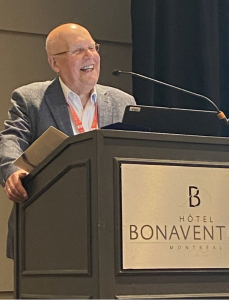
Zellner Award Session at the 2022 ISBA World Meeting in Montreal (© Sylvia Frühwirth-Schnatter)
Herman K. van Dijk, the founder of the European Seminar on Bayesian Econometrics (ESOBE) and a founding member of the International Society for Bayesian Analysis (ISBA), passed away on 24 January 2025 at the age of 79 after a career in Bayesian econometrics spanning nearly 50 years. When Herman started working in Bayesian econometrics it was a small, niche field. Now Bayesian econometric methods are widely used for empirical research in all fields of economics and in particular macroeconomics. This is largely due to the computational revolution and the associated development of posterior simulation methods that Herman did so much to initiate with his work on Monte Carlo integration in the 1970s and early 1980s. His interest in computation continued throughout his career.
Herman was much more than a computational statistician. He was an economist as well with a keen interest in the interplay between the economics and the econometrics. He has many influential contributions on identification and its implications for posterior inference in economic models (e.g., from the classic supply-demand models through limited information models and models involving cointegration). And he has always been motivated by empirical considerations such as the need to move beyond linear stationary time series models to achieve good forecast performance. Herman was one of the first contributors to the Bayesian unit root literature and developed or worked with a range of nonlinear time series models. The importance of model combination in forecasting was also recognised by Herman as of great empirical importance and many of his contributions related to this.
He was active in research until the end. One of his most recent papers, “Challenges and Opportunities for 21st Century Bayesian Econometrics: A Personal View,” published in Studies in Nonlinear Dynamics and Econometrics in 2024 reflected upon the future usefulness of Bayesian methods in terms of “six societal challenges” which range from real world practicalities (e.g. inequality, climate change and the macroeconomy), through technical challenges (e.g. the need for empirically sensible econometric model building and the need for speed in the computational algorithms used for their posterior inference), the need for econometric models which allow for posterior and predictive distributions to change over time and the need for high quality Bayesian teaching to produce the future Bayesians who will carry out his ambitious plans for future research. Throughout his career he was always thinking of new ideas often in new fields and always founded on his knowledge and love of Bayesian methods.
Herman was far more than just a fine researcher, he was also an energetic and enthusiastic participant and organizer of Bayesian workshops and conferences. Not only was he the founder of ESOBE, but he also remained on the ESOBE board until the end and was a regular participant and lively interlocuter at the ESOBE workshops. The last time many of us saw him was at ESOBE in Örebro in August 2024 where he was his usual energetic self. No one else who attended will forget his insightful comments and questions that he would make during every presentation. He was always generous with his time, particularly with young researchers, offering feedback and helpful comments.
One of Herman’s greatest contributions to the Bayesian community is the large number of excellent Bayesian PhD students that he supervised over the years at Erasmus University and Tinbergen Institute. It is hard to think of another Bayesian econometrician who has produced so many fine students. His students, coauthors and friends, will always be grateful for his profound intellect, unwavering guidance, and the warmth he brought to the academic journey. His commitment as a mentor and scholar will continue to inspire generations. These students are one of his main legacies to the Bayesian econometrics community. The royalties of the Handbook of Bayesian Econometrics, published in 2011 with Oxford University Press, go into the Savage Fund of ISBA to sustain its endowment for awarding young researchers. In 1986, Herman himself was co-winner of the Savage Award for his thesis entitled Posterior Analysis of Econometric Models Using Monte Carlo Integration. The comprehensive textbook Econometric Methods with Applications in Business and Economics, published jointly with colleagues from Erasmus University Rotterdam in 2004 with Oxford University Press, reflects his engagement in teaching and promoting sound econometric and statistical analysis in Europe and internationally as well.
As member of the board or executive committee, Herman served many statistical and econometric societies. A founding member of ISBA, Herman played a crucial role in the construction of ISBA during its formation stage. His diplomatic skills were instrumental in building a bridge between more statistically oriented Bayesians and Bayesian econometricians. He was among the first Bayesians to become an Elected Fellow of ISBA in 2012. In the same year, he served as Founding Program Chair for the ISBA Section on Economics, Finance and Business (EFaB), and was awarded the Zellner medal in 2022. He also received many other honours and awards including being a Distinguished Author of the Journal of Applied Econometrics and an Elected Member of the International Statistical Institute. As director of the Tinbergen Institute and the Econometric Institute, he played a key role in developing and strengthening the Dutch school of time series econometricians.
He will be sorely missed by a legion of co-authors, collaborators, students and friends.
20 January 2025
Gary Koop
with contributions from Sylvia Frühwirth-Schnatter, Sylvia Kaufmann, Dimitris Korobilis, Francesco Ravazzolo
